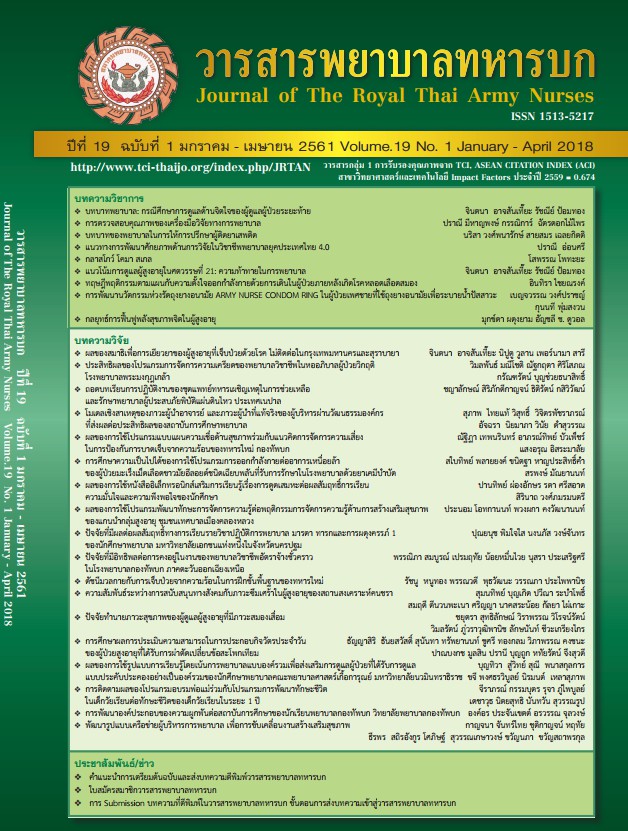โมเดลเชิงสาเหตุของภาวะผู้นำอาจารย์ และภาวะผู้นำที่แท้จริงของผู้บริหาร ผ่านวัฒนธรรมองค์กรที่ส่งผลต่อประสิทธิผลของสถาบันการศึกษาพยาบาล
Abstract
การวิจัยครั้งนี้มีวัตถุประสงค์เพื่อศึกษาภาวะผู้นำอาจารย์ ภาวะผู้นำที่แท้จริงของผู้บริหาร วัฒนธรรมองค์กร ประสิทธิผลของสถาบันการศึกษาพยาบาล พัฒนาและตรวจสอบความสอดคล้องกลมกลืนของโมเดลเชิงสาเหตุของปัจจัยที่ส่งผลต่อประสิทธิผลของสถาบันการศึกษาพยาบาลกับข้อมูลเชิงประจักษ์ ตัวอย่างเป็นอาจารย์พยาบาล ปีการศึกษา 2558 จากสถาบันการศึกษาพยาบาลที่ได้รับการรับรองจากสภาการพยาบาล จำนวน 536 คน วิธีการได้มาของตัวอย่างใช้การสุ่มแบบหลายขั้นตอน เครื่องมือที่ใช้ในการวิจัยเป็นแบบสอบถามมาตราส่วนประมาณค่า 5 ระดับ มีค่าความเชื่อมั่นทั้งฉบับ .98 วิเคราะห์ข้อมูลโดยใช้การวิเคราะห์ตัวแบบสมการโครงสร้างผลการวิจัยพบว่า 1) ภาวะผู้นำอาจารย์ ประกอบด้วย 4 องค์ประกอบ เรียงลำดับตามค่าน้ำหนักองค์ประกอบจากมากไปหาน้อย คือ วิชาการ เทคโนโลยีและนวัตกรรม การบริหารจัดการ และการเป็นตัวแบบด้านคุณธรรมและจริยธรรม ภาวะผู้นำที่แท้จริงของผู้บริหาร ประกอบด้วย 4 องค์ประกอบ เรียงลำดับตามค่าน้ำหนักองค์ประกอบจากมากไปหาน้อย คือ กระบวนการที่สมดุลความโปร่งใสเชิงสัมพันธ์ การตระหนักตน และมุมมองเชิงจริยธรรมภายในตน วัฒนธรรมองค์กร ประกอบด้วย 5 องค์ประกอบ เรียงลำดับตามค่าน้ำหนักองค์ประกอบจากมากไปหาน้อย คือ การมุ่งเน้นการทำงานเป็นทีม การสร้างความมั่นคง นวัตกรรมและความกล้าเสี่ยง การดำเนินการเชิงรุก และการมุ่งเน้นผลสำเร็จในการดำเนินงาน ส่วนประสิทธิผลของสถาบันการศึกษาพยาบาลประกอบด้วย 4 องค์ประกอบ เรียงลำดับตามค่าน้ำหนักองค์ประกอบจากมากไปหาน้อย คือ การร่วมมือ การควบคุม การสร้างสรรค์และการแข่งขัน 2) โมเดลสมการโครงสร้างเชิงเส้นประสิทธิผลของสถาบันการศึกษาพยาบาลที่พัฒนาขึ้นมีความสอดคล้องกลมกลืนกับข้อมูลเชิงประจักษ์ ตามเกณฑ์ดังนี้ Chi-Square = 72.607, df = 71, P-value = .425, GFI = .985, AGFI = .967, RMSEA = .007, RMR = .009 โดยปัจจัยเชิงสาเหตุด้านภาวะผู้นำอาจารย์ ภาวะผู้นำที่แท้จริงของผู้บริหาร และวัฒนธรรมองค์กร ร่วมกันอธิบายความแปรปรวนของประสิทธิผลของสถาบันการศึกษาพยาบาลได้ร้อยละ 70.67
A Causal Model of Teacher Leadership and Authentic Leadership of Administrators, with Organizational Culture as Mediator, Affecting Effectiveness of Nursing Education Institutions
The objectives of this research were to study teacher leadership, authentic leadership of administrators, organizational culture, effectiveness of nursing education institutions and investigate the congruence between a linear structural equation model of effectiveness of nursing education institutions and empirical data. The sample consisted of 536 nursing instructors in 2015 academic year from nursing education
institutions which were accredited by the Thailand Nursing and Midwifery Council, selected by multistage random sampling technique. The research instruments were the questionnaires using the 5 rating scales with reliability 0.98. Structural equation modeling was used to test and validate the mediation model. The finding revealed that: 1) The teacher leadership consisted of 4 factors according to priority of factor loading as following: instruction, technology and innovation, management, moral and ethical role model. The authentic leadership of administrators consisted of 4 factors according to priority of factor loading as following: balance processing, rational transparency, self awareness and internalized moral perspective. The organizational culture consisted of 5 factors according to priority of factor loading as following: team
orientation, stability, innovation and risk taking, aggressiveness and outcome orientation. The effectiveness of nursing education institutions consisted of 4 factors according to priority of factor loading as following: collaborative view, control view, creative view and competition view. 2) The developed linear structural equation model of effectiveness of nursing education institutions was congruence with empirical data as
following criterion: Chi-Square = 72.607, df = 71, P-value = .425, GFI = .985, AGFI = .967, RMSEA = .007, RMR = .009. Teacher leadership, authentic leadership of administrators, and organizational culture jointly explained 70.67% of variation in effectiveness of nursing education institutions.
Downloads
Downloads
Published
How to Cite
Issue
Section
License
บทความหรือข้อคิดเห็นใดใดที่ปรากฏในวารสารพยาบาลทหารบกเป็นวรรณกรรมของผู้เขียน ซึ่งบรรณาธิการหรือสมาคมพยาบาลทหารบก ไม่จำเป็นต้องเห็นด้วย
บทความที่ได้รับการตีพิมพ์เป็นลิขสิทธิ์ของวารสารพยาบาลทหารบก
The ideas and opinions expressed in the Journal of The Royal Thai Army Nurses are those of the authors and not necessarily those
of the editor or Royal Thai Army Nurses Association.






